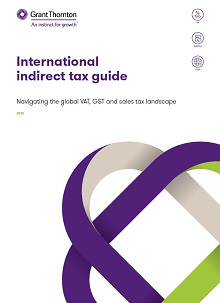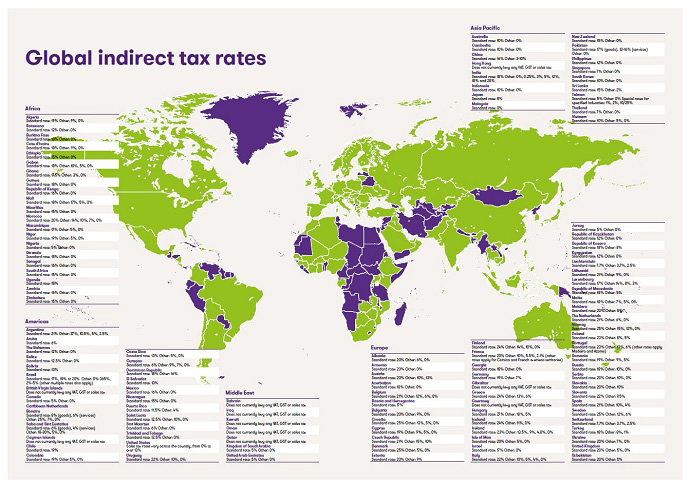-
Statutory Audit
We conduct an integrated audit, which combines the financial statement audit,independent and objective assurance on financial information, transactionsand processes.
-
Limited Review
We offer services relating to reviews of historical financial informationby expressing negative assurance on such historical financial information.
-
Agreed Upon Procedures
We engage with organisationsto perform specific procedures and report findings to conform to their needs.
-
Financial Reporting Advisory Services (FRAS)
Our team provides timely advice on the impact of accounting changes to assist businesses in the development of an appropriate implementation roadmap.
-
Business Consulting
Grant Thornton UAE provides organisations with implementable plans that drive sustainable growth strategies to grow and optimise their business performance.
-
Business Risk Services
Organisations need to understand risks thoroughly to be able to manage them better. Grant Thornton UAE helps businesses achieve the best balance between minimising risk exposure, optimising profitability and developing compliance review checklists.
-
Regulatory Advisory Services
Grant Thornton UAE's extensive understanding of the overarching supervisory framework within the region equips our professionals to support financial institutions comply and abide by the set of regulatory mandates throughout the rapidly evolving ecosystem.
-
M&A and Transactions Advisory
Grant Thornton UAE works with organisations on transactions from start to finish, assisting with strategy, identifying risks, executing deals, and helping to unlock their potential for growth and value creation.
-
Restructuring Advisory
Grant Thornton UAE is committed to realising value for shareholders, in a way that recognises and supports the interests of all stakeholders. Our solutions maximise value, provide clarity and direction, and accelerate recovery and transformation for businesses.
-
Technology Advisory & Cybersecurity
IT and technology are fundamental to drive the performance of businesses. Through leveraging the power of technology, Grant Thornton UAE helps organisations define and identify growth opportunities to achieve value-driven transformation and innovation.
-
Forensics
Fraud and corruption pose a growing challenge worldwide. As the commercial landscape changes, an increasingly regulated environment requires stringent governance and compliance processes. Grant Thornton UAE helps organisations navigate challenges and crisis with a hands-on approach coupled with the use of technology.
-
ESG Services
The Environment, Social and Governance (ESG) agenda has gained significant traction over the years, to become one of the key strategic aspects of any business. It is imperative that all organisations, irrespective of industry sector, engage with their stakeholders and prioritise ESG practices to unlock sustainable growth opportunities.
-
Business Process Solutions
Our team at Grant Thornton offers comprehensive and cost effective outsourced solutions, enabling stakeholders and business owners to focus on their core business goals.
-
Corporate Tax
Our diversified team of corporate tax subject matter experts combines a perfect blend of international experience across several industry sectors, technical expertise, and commercial nuances with a commitment to deliver exceptional value to your business.
-
VAT
The VAT team at Grant Thornton is well versed with the VAT Laws applicable across the region and holds valuable experience and professional accreditation in assisting clients across diverse industries to comply with the VAT obligations.
-
Transfer Pricing
Grant Thornton UAE assists its clients in providing transfer pricing solutions that are implementable and operational, considering the facts and concerns of its clients.
-
International Tax and Tax Due Diligence
Grant Thornton UAE supports multinational groups to optimise their tax structures. We can also assist businesses in analysing existing group transactions and inter-group supplies, as well as advising on potential implications of various taxes to facilitate an efficient Group tax structure.
-
Economic Substance Requirements
Economic Substance rules were introduced in the UAE in 2019, requiring UAE businesses that undertake certain ‘Relevant Activities’ to maintain and demonstrate adequate substance.
-
Customs and International Trade
The team at Grant Thornton is positioned centrally to assist the businesses with global cross-border tax structuring, planning and compliance needs.
-
Excise Tax
We provide Excise Tax related advisory and compliance services to the producer, importer, and the storekeeper of excisable goods
Indirect taxation is still evolving, and an arguable simple tax is growing in its complexity and application as a traditional goods and services model is replaced with digital content; virtual consumption and seamless international trade flows. But how can you stay ahead?
We are seeing many changes relating to registration requirements, digital reporting requirements, the approach to audits and compliance by tax authorities and the approaches to taxing the digital economy. It has been said that we are now living in a volatile, uncertain, complex and ambiguous (VUCA) world, and in relation to international indirect taxes, this is certainly the case. We have outlined just a few of the indirect tax trends below, please download our complete guide for more information [ 8899 kb ].
Indirect tax is the new direct tax
While there appears to be a trend for corporate income tax rates being lowered, VAT, GST and sales tax rates are generally increasing. Tax authorities are realising that taxing revenue and actual transactions can raise more revenue than simply focusing in on profit, which can often be subjective and subject to manipulation. Put simply, it’s easier to tax the transactions that create the outcomes, rather than the outcomes themselves.
New indirect tax systems
Many of the emerging markets are introducing new indirect tax systems. Over the last 12 months we have seen India carry out landmark economic reform by introducing GST, replacing several different taxes at a state or national level. We have also seen the first two Gulf Cooperation Council (GCC) states introduce VAT – namely the United Arab Emirates and Saudi Arabia.
It’s also expected that the other GCC states will follow shortly in 2019. In Malaysia, the country is repealing GST and reverting to a sales and services tax. China also continued its tax reform and has recently completed the final transition from Business Tax on services to VAT.
Taxing the digital economy
It’s been 15 years since the European Union (EU) introduced specific targeted legislation to tax the digital economy. It did this by forcing non-EU businesses providing digital services to private consumers in the EU member states to register for VAT and charge VAT based on the customer location.
This legislation was originally controversial, and businesses were slow to comply. This is now a genuine trend and the legislation has inspired similar laws across the globe. It seems that almost every month another country announces new legislation targeting non-resident supplies of digital services.
This is particularly a growing trend in the APAC region, including Australia who introduced the ‘Netflix’ tax, as well as, New Zealand, South Korea, and Taiwan. Singapore is also one of several countries announcing similar future plans. There are lots of challenges for businesses to consider, including identifying and evidencing customer location, calculating and charging the right rate of tax, meeting local invoicing requirements, as well as making payments in foreign currencies.
Expanding definition of ‘nexus’ – Wayfair
It is not just digital services that are increasingly being taxed in the emerging digital economy, but also supplies of goods from suppliers outside of the country or state by online webstores and online marketplaces. The recent ‘Wayfair’ decision in the US could be the most significant indirect tax court decision in a generation.
Changes to customs processes – Brexit
The ‘Brexit’ decision of the British public to leave the EU has large possible ramifications across indirect taxes. It has also shone a light on supply chains, and customs duty, often seen as the ‘Cinderella’ tax, has gained more headlines in the media. Businesses in the UK and Europe are now modelling the potential impact of different trading relationship models on cash and cash-flow.
In addition to Brexit, importers and exporters should also be aware that the UK is replacing its Customs Handling of Import and Export Freight (CHIEF) customs declaration system and will launch a new ‘Customs Declaration Service’ system in 2019 – another change for businesses to add to their roadmap to be prepared for. While there is uncertainty, many businesses are carrying out ‘no regrets’ actions, for example looking to obtain ‘trusted trader’ position by obtaining Authorised Economic Operator (AEO) status.
Digitalisation of VAT compliance
The direction of travel for international indirect tax compliance is very clear, it’s digital and near real-time. Historically, tax authorities accepted paper invoicing and adopted a ‘post-audit’ approach, where the taxpayer charged tax on an invoice and this would only be audited after the fact.
Often by a tax inspector or auditor physically looking at invoices and records. This would often be based on sampling – a riskbased approach to compliance. Taxpayers themselves may have only needed to physically submit a periodic summary VAT/GST return, often paper. However, the trends seen across the globe include a shift to mandatory electronic invoicing. An example of this is Italy which will introduce mandatory business-to-business electronic invoicing from January 2019.
As well as the customer receiving an electronic invoice, many tax authorities also receive it as well as receiving tax, master and transactional data in real time.
How can you keep up to speed?
How should businesses and their indirect tax functions respond to the changes and uncertainty in relation to international indirect taxes? Working with our network of member firms we have compiled this global guide of indirect tax systems in key countries and how you can get further support.
Indirect tax rates map
We hope you enjoy the International indirect tax guide 2018. Please do share any feedback with us and also join our VAT Club group on LinkedIn to view global VAT/GST and sales tax news, updates and thought leadership on international indirect tax.


